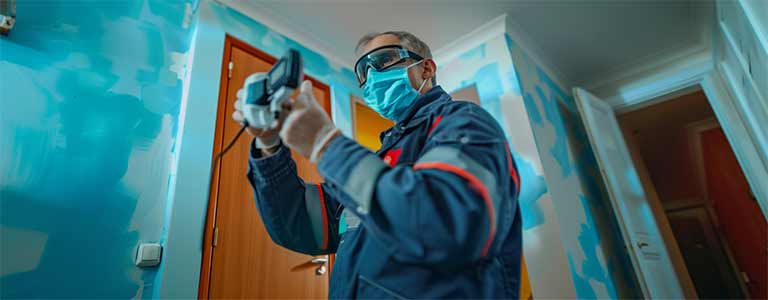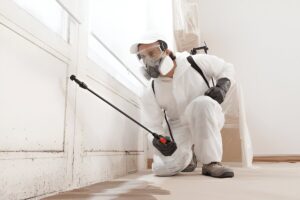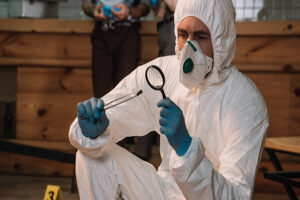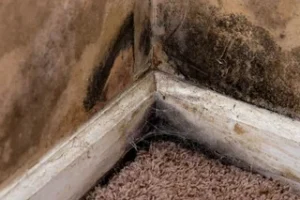Mold growth is a common concern for homeowners and businesses alike, particularly in areas with high humidity levels like Plainfield, New Jersey. Understanding mold detection solutions is crucial for maintaining a safe and healthy environment. This article delves into various aspects of mold detection in Plainfield, inspection, and remediation, providing insights into effective strategies for managing mold issues in your property.

Understanding Mold: The Basics
Mold is a type of fungus that thrives in damp environments. It reproduces through spores that can easily become airborne, leading to potential health risks and structural damage. Mold can grow on various surfaces, including wood, drywall, and carpets, making it essential to identify and address mold issues promptly.
Types of Mold
There are several types of mold, each with its characteristics and potential health impacts:
- Aspergillus: Commonly found in homes, it can cause respiratory issues.
- Cladosporium: Often appears as black or green spots and can trigger allergies.
- Stachybotrys: Known as black mold, it is particularly harmful and can lead to severe health problems.
Health Risks Associated with Mold
Exposure to mold can lead to various health issues, especially for individuals with pre-existing conditions. Common symptoms include:
- Respiratory problems
- Allergic reactions
- Skin irritations
- Fatigue and headaches
Understanding these risks underscores the importance of effective mold detection solutions.
The Importance of Mold Detection Solutions
Mold detection solutions are vital for identifying mold presence before it escalates into a more significant problem. Early detection can save homeowners and businesses from costly repairs and health complications.
Benefits of Timely Mold Detection
- Health Protection: Reduces the risk of mold-related health issues.
- Property Preservation: Prevents structural damage and costly repairs.
- Peace of Mind: Ensures a safe living or working environment.
Mold Inspection: The First Step
Mold inspection is the initial step in addressing mold issues. It involves a thorough examination of the property to identify potential mold growth areas.
What to Expect During a Mold Inspection
- Visual Assessment: Inspectors will look for visible signs of mold, such as discoloration or water damage.
- Moisture Measurement: Using specialized tools, inspectors measure humidity levels to identify damp areas conducive to mold growth.
- Air Quality Testing: Samples of air may be collected to analyze mold spore levels.
Choosing a Qualified Inspector
When selecting a mold inspector, consider the following:
- Certifications: Ensure they are certified by recognized organizations.
- Experience: Look for inspectors with a proven track record in mold detection.
- Reviews: Check customer testimonials for insights into their service quality.
Mold Testing: Confirming the Presence of Mold
Once an inspection is complete, mold testing may be necessary to confirm the presence and type of mold.
Types of Mold Testing
- Air Sampling: Measures the concentration of mold spores in the air.
- Surface Sampling: Involves taking samples from surfaces suspected of mold growth.
- Bulk Sampling: Collects materials suspected of harboring mold for laboratory analysis.
Importance of Professional Testing
Professional mold testing provides accurate results, helping to determine the extent of the mold problem and guiding remediation efforts.
Mold Remediation: Effective Solutions
Mold remediation is the process of removing mold and restoring the affected area to a safe condition. It is crucial to engage professionals for this task to ensure thorough and safe removal.
Steps in the Mold Remediation Process
- Containment: Isolating the affected area to prevent mold spores from spreading.
- Air Filtration: Using HEPA filters to capture airborne mold spores.
- Mold Removal: Safely removing mold-infested materials and cleaning surfaces.
- Restoration: Repairing and restoring the affected areas to their original condition.
DIY vs. Professional Remediation
While some minor mold issues can be addressed through DIY methods, significant infestations require professional intervention. Professionals have the expertise and equipment to handle mold safely and effectively.
Preventive Measures: Keeping Mold at Bay
Preventing mold growth is as important as detection and remediation. Implementing preventive measures can significantly reduce the risk of mold development.
Key Prevention Strategies
- Control Humidity: Use dehumidifiers to maintain indoor humidity levels below 60%.
- Proper Ventilation: Ensure adequate airflow in areas prone to moisture, such as bathrooms and kitchens.
- Regular Inspections: Conduct routine inspections to identify potential mold growth areas.
Home Maintenance Tips
- Fix Leaks Promptly: Address plumbing leaks and roof leaks immediately to prevent moisture accumulation.
- Clean Gutters: Regularly clean gutters to prevent water from pooling around the foundation.
- Use Mold-Resistant Products: Consider using mold-resistant paints and materials in moisture-prone areas.
The Role of Insurance in Mold Issues
Understanding your insurance coverage regarding mold damage is essential for homeowners. Many policies have specific clauses related to mold remediation.
What to Know About Mold Coverage
- Policy Limits: Check your policy for coverage limits related to mold damage.
- Exclusions: Be aware of any exclusions that may apply, such as mold resulting from neglect.
- Documentation: Keep thorough records of any mold inspections and remediation efforts for insurance claims.
Local Resources for Mold Detection in Plainfield
Plainfield, New Jersey, offers various resources for residents dealing with mold issues. Local professionals can provide expert assistance in mold detection and remediation.
Recommended Local Services
- Mold Inspection Companies: Look for certified mold inspectors in the area.
- Remediation Specialists: Engage local remediation services for effective mold removal.
- Community Resources: Utilize local health departments for information on mold-related health risks.
Conclusion: Taking Action Against Mold
Mold detection solutions in Plainfield, New Jersey, are essential for maintaining a healthy living environment. By understanding the importance of mold inspection, testing, and remediation, homeowners can take proactive steps to protect their properties and health. Implementing preventive measures and engaging local resources can further enhance mold management efforts, ensuring a safe and mold-free home.
For more information about surface sampling for Mold Detection in Plainfield please contact:
Business Name: Green Guard Mold Remediation Plainfield
Address: 321 E 3rd St, Plainfield, NJ 07060
Phone: 888-793-7963
website: https://greenguardmoldplainfield.com/



